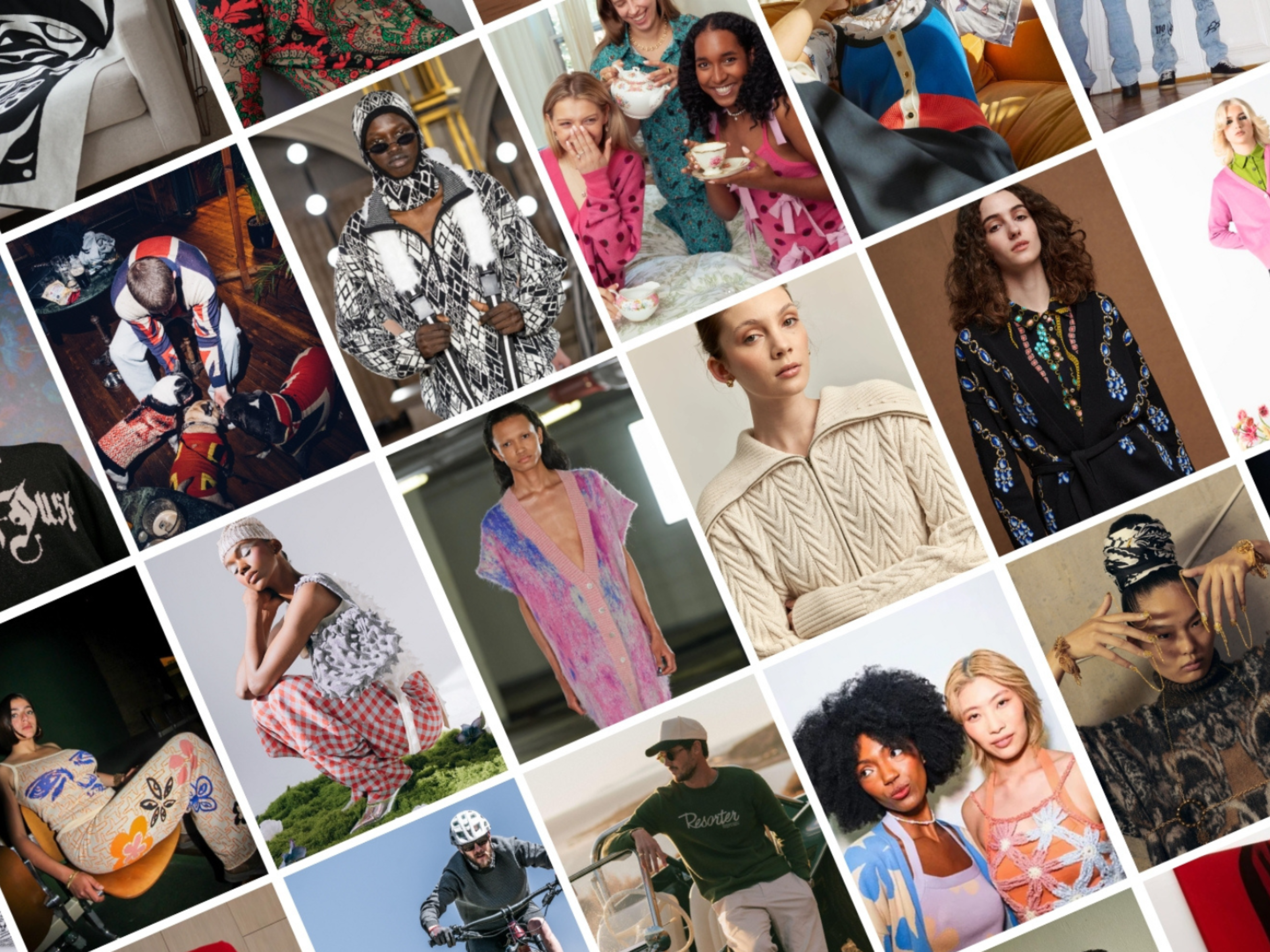
Through its on-demand manufacturing platform, Knitup is helping clothing companies curb waste with data-driven design and rapid production timelines.
The future of fashion is less.
Or at least that’s the promise of Knitup, a customised clothing platform born out of a collaboration between supply chain manager Fung Group and its subsidiary, knitwear producer Cobalt Fashion. It says the most responsible production practices are those that eliminate waste before it begins.
Traditional fashion manufacturing cycles are long and rigid, built on forecasts and bulk production. But fashion trends are fast-moving and highly flexible – clothes that companies spend months designing go out of fashion in weeks. The result? Excess inventory, lost profit, and a ton of waste.
Knitup is shaking things up by combining small-batch manufacturing with real-time data insights to eliminate guesswork and waste. It reduces lead times from months to just three weeks, allowing brands to capitalise on social trends that are still fresh.
Essentially, clients can use the made-to-order model to design knitwear on Knitup’s online studio, and get it delivered to them fast. It enables them to drop new pieces and restock quickly, or even launch limited capsule collections without delays or inventory risks.
Each production cycle generates valuable data, which can inform how future designs can be refined, which successful styles to replenish, and which underperforming designs to cut.
The platform is split into two services. Essentials has no minimums and offers a three-week lead time, while Atelier is a more advanced tool with a greater range of yarns and stitches (but needing more investment from brands).
Knitup offers five materials: Better Cotton Initiative-certified cotton, recycled viscose nylon, biodegradable Australian Merino wool, and cashmere accredited by the Good Cashmere Standard.
In an interview with Green Queen, Knitup founder Dorothy Pun discusses the sustainability and ethics related to the materials, how it accelerates production timelines, and the difference between its two services.
This interview has been lightly edited for clarity and concision.
Green Queen: Could you give us some examples of how waste occurs in the fashion industry?

Dorothy Pun: In the fashion industry, traditional production typically requires a minimum of hundreds or thousands of pieces per design and a lead time of several months. With this system in place, manufacturers require brands to forecast demand and trends a full year in advance.
As with any form of guesswork, these forecasts are not entirely accurate, resulting in excess inventory when designs fail to meet anticipated sales.
GQ: How do you cut the production time to just three weeks? Can you walk us through your process?
DP: We invested in digitalising the knit creation process. Our platform automatically translates designs into knittable data, and users can see visualisations of their designs in a real-time 3D render, which cuts down on the back-and-forth sampling.
The render acts as a digital twin to the final product; once confirmed and the order is placed, the ready knit data will be fed directly to machines to begin production.
GQ: Cashmere and wool account for a fifth of the industry’s methane emissions, cotton is responsible for large amounts of land use and emissions, while mixed materials like the nylon you use come with their own end-of-life issues – how do you navigate these environmental challenges?
DP: We source our fibres from sustainable sources, ensuring knits are both responsible and stylish. Our commitment to sustainability is reinforced through partnerships with mills that uphold globally recognised standards.
For example, our cotton is certified by the Better Cotton Initiative, the world’s leading sustainability initiative for cotton. It aims to promote sustainable cotton farming practices that reduce water usage, minimise harmful pesticides, improve soil health, and support biodiversity while also enhancing the well-being and economic development of cotton farming communities, and drive global demand for sustainable cotton.
Similarly, one of our merino wool options is certified under the Responsible Wool Standard, an industry tool designed to recognise the best practices of farmers, ensuring that wool comes from farms with a progressive approach to managing their land, and from sheep that have been treated responsibly.
For cashmere, we adhere to the Good Cashmere Standard, an independent certification for sustainable cashmere, developed by the Aid by Trade Foundation, that aims to improve the welfare of cashmere goats, the working conditions of herders, and to protect the environment.

GQ: Have you considered using alternative materials made from fermentation, plants, or cell culture?
DP: Being powered by Cobalt Fashion, the world’s largest knitwear producer, we have access to the vast network of yarn mills and industry innovators. This network enables us to source and procure a wide range of distinctive and high-quality materials tailored specifically to meet the unique requirements of our customers’ design visions.
GQ: What’s the difference between the Essentials and Atelier services? What are the costs and minimum order quantities?
DP: Can you tell us which brands you’ve worked with? The Essentials route brings designs to life without minimums or production constraints. Design free on the Knitup Studio, where users have a plethora of combinations to choose from: market-tested silhouettes, quality materials, stitch constructions and colours.
The Knitup Studio showcases three pricing tiers: Sample (up to 19 pieces), Capsule (20-99 pieces) and Bulk (100+ pieces), with exact cost depending on the design combination chosen. For reference, a men’s oversized crewneck pullover in BCI Cotton Graphic Jacquard costs $119 per piece for the Sample tier, $58 for Capsule, and $29 for Bulk.
Atelier is a specialised service that unlocks unlimited creative possibilities to craft something truly extraordinary. While the Atelier approach involves a more significant investment and a higher minimum order quantity compared to designing your own pieces online via Knitup Essentials, it’s where unparalleled customisation comes to life.
The cost and minimums in the Atelier service may vary depending on the complexity of one’s tech pack. The typical minimum order quantity for Atelier is 100 pieces per style with an average bulk price of around $40 per piece.

GQ: Can you tell us which brands you’ve worked with?
DP: We work with brands across the globe, such as Mains London, Manors Golf, Ministry of Supply, and many more. We also respect those who wish not to disclose their manufacturers.
GQ: How does your business model work? Can you tell us about your revenues?
DP: Knitup models a new kind of design-to-manufacturing platform that caters to everyone, from visionary artists and makers to small businesses and even large global corporations. We bridge the gap between creativity and commerciality by enabling easy access to a complex knitwear supply chain.
Our deep heritage in manufacturing, combined with cutting-edge technology and extensive know-how, unlocks a world of possibilities for a creator, brand, or business. It is through this that we have worked with, and helped realise the knitwear dreams of, over 800 brands worldwide.
The post How Knitup is Shedding Fashion Industry Waste with A Custom Knitwear Platform appeared first on Green Queen.
This post was originally published on Green Queen.